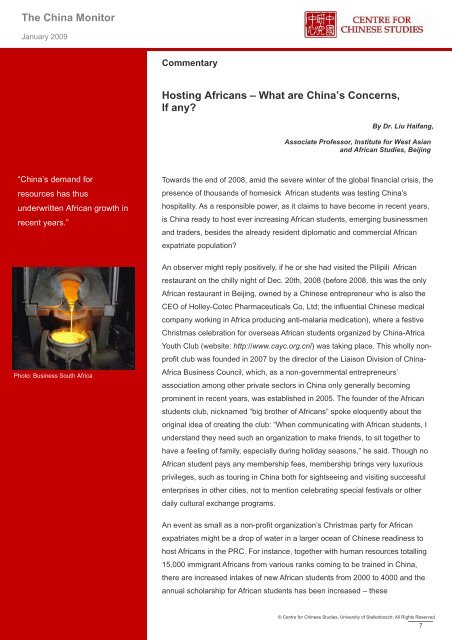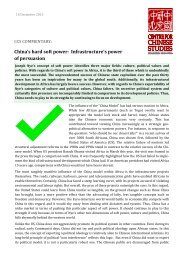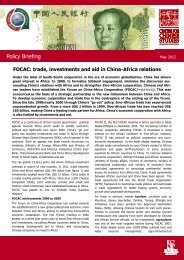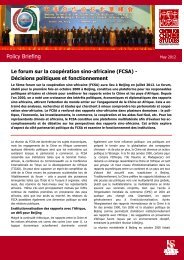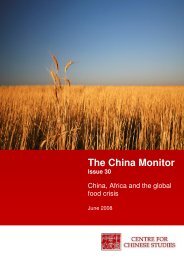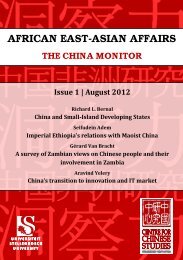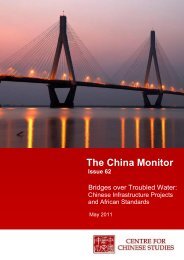<strong>The</strong> <strong>China</strong> <strong>Monitor</strong>January 2009“Northern <strong>Chinese</strong> cities havea mix bag of Africans. InBeijing, being the capital of<strong>China</strong>, there is apreponderance of Africanswho officially represent theircountries in the embassies.”Macau, a <strong>for</strong>mer Portuguese colony at the mouth of the Pearl River, also has asizeable African population of about 300, mostly from <strong>for</strong>mer Portuguese coloniessuch as Angola and Mozambique. Northern <strong>Chinese</strong> cities host a mixed bag ofAfricans. In Beijing, the capital of <strong>China</strong>, there is a preponderance of Africans whoofficially represent their countries within embassies and other internationalorganizations. A sizeable number of African students live in the capital but also atAfrican <strong>Studies</strong> <strong>Centre</strong>s like that in Zhejian Normal University, Hangzhou. InShanghai, being the most cosmopolitan city in <strong>China</strong>, all these categories ofAfricans can be found.How are these Africans received in <strong>China</strong>? Fellow Africans I have interacted with,especially in the course of my field research <strong>for</strong> my <strong>for</strong>thcoming book, Africans in<strong>China</strong>, report cases of racism and other kinds of discrimination, which may stemfrom linguistic and cultural misunderstanding. But this is not an entrenchedsystematic practice. On the contrary, the African in <strong>China</strong> can sometimes be theobject of positive curiosity as there are still many <strong>Chinese</strong> who have not come intoclose contact with Africans, even if they have seen them on news media.<strong>The</strong> author visits the famed Pilipilirestaurant in Beijing, a popular venue <strong>for</strong>expatriate Africans in the city.Photo: Adams BodomoAfrican migration in contemporary <strong>China</strong> represents an important dimension in theburgeoning relationship between Africa and <strong>China</strong>, as is the case with <strong>Chinese</strong>migration to contemporary Africa. Both the <strong>Chinese</strong> government, on the one hand,and African governments, on the other, ought thus to encourage and facilitate thepeaceful mingling of Africans and <strong>Chinese</strong>, as Africans in <strong>China</strong> and <strong>Chinese</strong> inAfrica can serve as cultural and economic bridges to the further development ofAfrica-<strong>China</strong> relations.HKU introduces new programme in African <strong>Studies</strong> – the first ofits kind in Hong Kong and Southern <strong>China</strong><strong>The</strong> University of Hong Kong (HKU) has introduced a new Bachelor ofArts (BA) Programme in African <strong>Studies</strong> at the School of Humanities,Faculty of Arts. This is the first of its kind in Hong Kong and southern<strong>China</strong>.Dr. Adams Bodomo isAssociate Professor ofLinguistics and African<strong>Studies</strong> at the Universityof Hong Kong and aCoordinator of theuniversity’s African<strong>Studies</strong> Programme.Students from all Faculties can take individual courses <strong>for</strong> credit inFoundations in African <strong>Studies</strong>, Introduction to African Linguistics,Swahili Structure and Universal Grammar, Proficiency Course in anAfrican Language, African Music, Arts of West, Central and SouthernAfrica, Africa-<strong>China</strong> Relations, and Educational Field Trip to Africa toobtain a BA Minor in African <strong>Studies</strong>.For more in<strong>for</strong>mation about the programme, please consult the African<strong>Studies</strong> website at: http://www.hku.hk/African<strong>Studies</strong> or consult ourUndergraduate Admissions staff by email: africa@hkucc.hku.hk© <strong>Centre</strong> <strong>for</strong> <strong>Chinese</strong> <strong>Studies</strong>, University of Stellenbosch; All Rights Reserved6
<strong>The</strong> <strong>China</strong> <strong>Monitor</strong>January 2009CommentaryHosting Africans – What are <strong>China</strong>’s Concerns,If any?By Dr. Liu Haifang,Associate Professor, Institute <strong>for</strong> West Asianand African <strong>Studies</strong>, Beijing“<strong>China</strong>’s demand <strong>for</strong>resources has thusunderwritten African growth inrecent years.”Towards the end of 2008, amid the severe winter of the global financial crisis, thepresence of thousands of homesick African students was testing <strong>China</strong>’shospitality. As a responsible power, as it claims to have become in recent years,is <strong>China</strong> ready to host ever increasing African students, emerging businessmenand traders, besides the already resident diplomatic and commercial Africanexpatriate population?An observer might reply positively, if he or she had visited the Pilipili Africanrestaurant on the chilly night of Dec. 20th, 2008 (be<strong>for</strong>e 2008, this was the onlyAfrican restaurant in Beijing, owned by a <strong>Chinese</strong> entrepreneur who is also theCEO of Holley-Cotec Pharmaceuticals Co, Ltd; the influential <strong>Chinese</strong> medicalcompany working in Africa producing anti-malaria medication), where a festiveChristmas celebration <strong>for</strong> overseas African students organized by <strong>China</strong>-AfricaYouth Club (website: http://www.cayc.org.cn/) was taking place. This wholly nonprofitclub was founded in 2007 by the director of the Liaison Division of <strong>China</strong>-Photo: Business South AfricaAfrica Business Council, which, as a non-governmental entrepreneurs’association among other private sectors in <strong>China</strong> only generally becomingprominent in recent years, was established in 2005. <strong>The</strong> founder of the Africanstudents club, nicknamed “big brother of Africans” spoke eloquently about theoriginal idea of creating the club: “When communicating with African students, Iunderstand they need such an organization to make friends, to sit together tohave a feeling of family, especially during holiday seasons,” he said. Though noAfrican student pays any membership fees, membership brings very luxuriousprivileges, such as touring in <strong>China</strong> both <strong>for</strong> sightseeing and visiting successfulenterprises in other cities, not to mention celebrating special festivals or otherdaily cultural exchange programs.An event as small as a non-profit organization’s Christmas party <strong>for</strong> Africanexpatriates might be a drop of water in a larger ocean of <strong>Chinese</strong> readiness tohost Africans in the PRC. For instance, together with human resources totalling15,000 immigrant Africans from various ranks coming to be trained in <strong>China</strong>,there are increased intakes of new African students from 2000 to 4000 and theannual scholarship <strong>for</strong> African students has been increased – these© <strong>Centre</strong> <strong>for</strong> <strong>Chinese</strong> <strong>Studies</strong>, University of Stellenbosch; All Rights Reserved7


